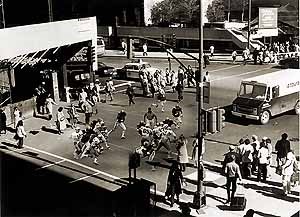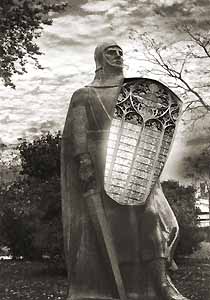 Of all the difficult issues we encounter while navigating our way through the oftentimes-rough-terrain of “relationship dynamics”, allowing ourselves to become part of triangle relationships is one of the most common.
Of all the difficult issues we encounter while navigating our way through the oftentimes-rough-terrain of “relationship dynamics”, allowing ourselves to become part of triangle relationships is one of the most common.A triangle relationship exists when three people begin to act with behavior that for the purposes of this note can roughly be labeled as PERSECUTOR, VICTIM and RESCUER. The magic of triangulated relationships is that as soon as all three people are within hearing distance of the other, it only takes the action of one to bring all three into their separate and specialized roles.
And this dynamic is especially true in the relationships addicts have with the “important people” in their lives – and by “important people” I’m referring to the people whose words and actions (whether they realize it or don’t realize it, admit it or deny it) enable and support the addicts addiction and/or their addictive behavior.
Triangles exist within nearly all relationship structures and they almost always replace clarity with confusion, peace with chaos, unity with division, and building-up with tearing-down. So while triangles might make a “sweet, bell-like sound” when they’re part of a 3rd grade rhythm band … when triangles are part of our relationships, the “sound” they make is usually anything but “sweet.”
- Parents can have triangles with children … parent 1 + child + parent 2.
- Spouses can have triangles with in-laws … husband + in-law + wife.
- Teachers can have triangles with students … parent + teacher-child + student.
- Friends can have triangles with one another … friend 1 + friend 2 + friend 3.
- And addicts nearly always have triangles with the non-drug/non-alcohol-using “important people” in their lives … family-friend 1 + addict + family-friend 2.
Here’s who occupies the three corners of the made-up case study triangle relationship …
NAME ... Bill
RELATIONSHIP ... Step-Father
ROLE ASSUMED ... PERSECUTOR
NAME ... Stacy
RELATIONSHIP ... Daughter and Addict
ROLE ASSUMED ... VICTIM
NAME ... Jessica
RELATIONSHIP ... Biological
ROLE ASSUMED ... RESCUER
And here are some of the details of the triangle relationship that exist between Jessica, Stacy and Bill …
- Since Bill began dating Jessica, he notices a pattern of rude behavior from Stacy to Jessica. Jessica seems to hardly notice how often she is put-down, lied to and marginalized by Stacy’s words and behavior.
- Bill also notices how Stacy bends all the rules to suit her wants, desires, and addiction needs.
- Bill decides that once he and Jessica are married and he becomes Stacy’s step-father, that things will change.
Sound familiar? And I’m not just talking about “does it sound like a recent episode of As The World Turns?” This is what happens in “real life relationships”. So what’s happening in this all-too-common scenario?
When Bill married Jessica, things changed in their home in ways no one had really anticipated. For instance …
- Stacy can no longer run through the house in her underwear.
- Bill works a split shift – arriving home at about 2:00 A.M. Because of this, Stacy can no longer use Jessica’s car late at night to sneak out with friends because when Bill comes home he’ll know whether Stacy is at home or out “running around”.
- When Jessica closes the bedroom door, Stacy can no longer barge in when she wants to talk, ask a question, or when she wants to borrow Jessica’s clothes.
And so with this plethora of new-found feelings firmly in tow, Stacy easily moves into one corner of this new triangle relationship and takes on the role of VICTIM, Bill moves into a second corner of this new triangle relationship and takes on the role of PERSECUTOR, and Jessica moves into the final corner of this new triangle relationship and takes on the role of RESCUER.
Now when Stacy says or does something that isn’t in line with the new rules that have been established, Bill corrects her with a firmness that Stacy calls “cruel and unusual punishment.”
Stacy then runs to Jessica with a cry for help and tells her story with some embellishment (you know, “creative American fiction writing”) to frame Bill as the “bad guy”, as the “reason her life is miserable” and as the source of her hurt feelings about no longer being at the center-of-mother's-attention, as the PERSECUTOR.
Now Jessica steps in and saves Stacy by telling her that “everything will be okay, and that Bill is a scoundrel,” but “what can she do because she loves him?” And while this makes Stacy and Jessica feel closer to each other and “on the same team”, it makes Bill feel like his authority has been under-cut and leaves him feeling embarrassed, frustrated, and angry – which of course, Stacy loves because his protesting defense makes him look even more guilty.
And so the triangle relationship cycle is born and continues as Stacy enjoys a false sense of finally being back in Jessica’s inner circle and Bill becomes relegated to a less important role.
Initially Stacy probably doesn’t have any idea how much pressure this triangle relationship puts on Jessica, but eventually her use of this new power becomes a weapon to drive out Bill and restore the old equilibrium of her “pre-Bill” relationship with Jessica.
Under her “pre-Bill” relationship, Jessica was particularly at risk for being manipulated by guilt. Already feeling exceedingly sad for being at least partly responsible for the pain that Stacy experienced through the divorce, Jessica compensates and becomes a target for guilt manipulation. All Stacy has to do is win one argument using this triangle relationship strategy, and she will use it for years and years … trying to win again and again. This is not unlike a person winning at gambling once and then finding it hard to stop gambling.
So what are some the detrimental results when addicts are in the role of the VICTIM?
- They develop a skill at manipulation – in fact, it can become a fine art.
- They develop a habit of drawing in other people who seem to have power in a relationship to solve their problems for them and will do the same on the job, OR in a marriage.
- They fail to develop the interpersonal skills needed to facilitate one-on-one negotiation and/or conflict resolution.
- They develop a victim mentality – and this mentality becomes the lens they use to look at all of life through. Once this fear is set in place, it becomes a self-fulfilling prophecy that keeps producing more "evidence" that the “important people” in their life are only there to abuse them and take advantage of them.
- They reduce optional responses to conflict to one of two choices … persecute or be persecuted … justifying their responses and the addictive cycles they kick-start by saying to themselves, "It's them or me. So I’ll just do unto others before they do unto me."
- They teach triangle relationships in the next generation by modeling it well, and by passing on another string of broken relationships.
- They seek counseling from a therapist, pastor, priest, rabbi or friend, and tell their story in such a way that whoever is in this “counselor” role feels like affirming all the bad feelings of the VICTIM or rescuing the poor VICTIM – often doing for the person the very things they should be doing for themselves.
- They easily get into a vicious circle of defending themselves – allowing their emotional exhibitions (which usually arise out of their frustrations and sense of failure) to confirm all the false accusations made against them.
- They begin to view others in their triangle relationships as "the problem" and end up making “power moves” – trying to change them or remove them through manipulation.
- They often fall into an "all or nothing" way of communicating, leading, or tending to others (i.e. offering ultimatums like “If you do that one more time I’ll call the police!” but then not following through), and at the same time they easily feel under-empowered within their own sphere of influence.
- They feel besieged by all sides.
- They don’t feel intimate, honest or trusted with any side.
- They fail to see the one really helpful role/s … which is the role/s they can play as coach, teacher, mentor or friend.
Healthy people aren’t frightened by the exploration of new ways to “do relationships”. Of course, the “one size fits all” idea is as mythical in the relationship realm as it is in the clothing market. So will all the ideas I’ve shared with you in this email be “a fit” for you and the road you are walking? Of course not. But some of them will. And so I invite you to try them on.
Let me close this note with an insightful piece by Portia Nelson entitled, An Autobiography in Five Short Paragraphs …
I walk down the street. There is a deep hole in the sidewalk.
I fall in. I am lost. I am helpless. It isn't my fault. It takes
forever to find a way out.
I walk down the street. There is a deep hole in the sidewalk.
I pretend I don't see it. I fall in. I can't believe I'm in the
same place, but it isn't my fault. It still takes a long time to
get out.
I walk down the street. There is a deep hole in the sidewalk.
I see it is there. I still fall in. It's a habit. My eyes are open.
I know where I am. It is my fault. I get out immediately.
I walk down the street. There is a deep hole in the sidewalk.
I walk around it.
I walk down a different street.
God bless you as you continue on the journey of learning to walk down different streets. Godspeed.
read.think.pray.live.
Gregg


